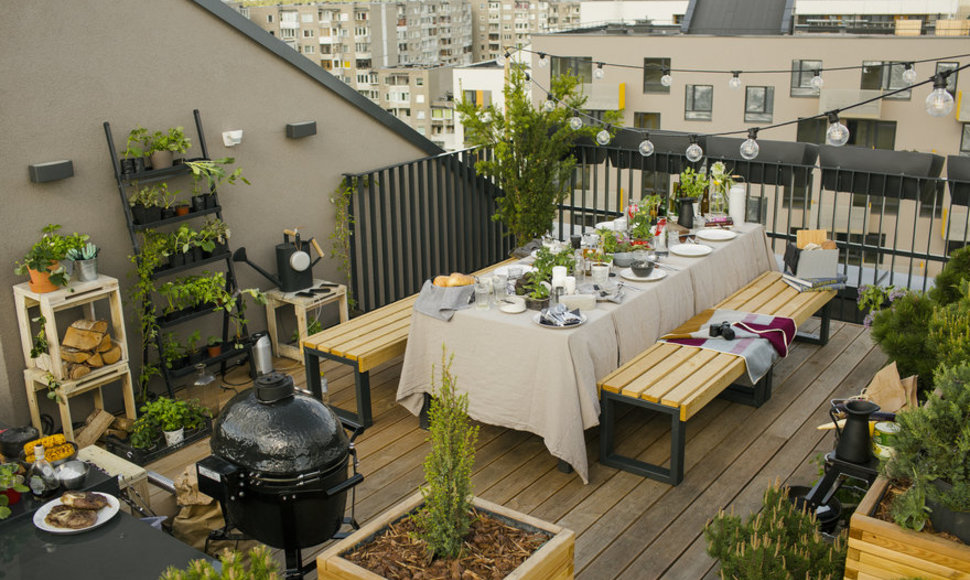Such statistical data was presented by Spinter Tyrimai, the market research and public opinion survey company. The survey was conducted by the request of Sustainable Urban Lab (Lith. Darnaus Mietso Laboratorija) incorporated by Darnu Group.
The results showed that the residents of Vilnius City found entertainment (18%), cultural infrastructure (12%), sustainable solutions (5%) and pieces of art and sculptures (4%) in the city to be no less important. These are the aspects that help to achieve a certain level of satisfaction with the community, and the sense of belonging to a community is directly related to the feeling of happiness.
“We comprehend the significance of public and artistic spaces and cultural infrastructure as a whole. We always highlight these matters in the projects developed by Darnu Group and pay exceptional attention to them in both residential projects and workspaces. We build cosy terraces and focus on public spaces in office centres. We see a trend, where people find it important to have a proactive community in their residential area. However, before going ahead and forming one, we need to find out the needs of the residents,” said Akvilė Liaudanskienė, Corporate and Marketing Manager at Darnu Group.
Donatas Baltrušaitis, Architecture and Urbanism Innovator, is convinced that encouraging the sense of community spirit can heavily impact one’s satisfaction with living in a certain district. According to him, such a need is completely human and natural; thus, the model to be employed might be a universal one.
Functional Spaces Bring Residents Together
D. Baltrušaitis is confident that the sense of belonging to a community is very important to people. This rule applies to all residents of any district in Vilnius City. Irrespective of their location, people should have the feeling of ownership of the territory they live in, to integrate themselves into the society and its processes, and, finally, to be able to take pride in their district. “These are fundamental matters that are of utmost significance to one’s happiness and no less important than the projects promoting the sense of community,” said D. Baltrušaitis.
In light of these needs of the residents, D. Baltrušaitis offers urban planners to focus more on the establishment and preservation of new public spaces. The efforts could take a wide range of forms, such as various courts, multifunctional gazebos, recreational areas, sports areas with gym and fitness equipment, original sculping solutions, perhaps even an amphitheatre, a small concert hall, local library or a garden.
“Architectural interventions that create opportunities to meet up and interact or engage in a variety of activities could become blitz projects. Yet, attempting to understand the needs of each community and finding out what it is that they truly need, be it spaces for meet-ups or food-centric festivals, is the most important task ever. If it is a festival they need, the first thing to do is to assess the need for shelter, to look for a place where seating could be arranged,” said D. Baltrušaitis.
Joint Ownership Increases Responsibility
The expert of Darnu Group claims that the second most important aspect in creating such spaces is allowing the community to understand that these objects belong to the community and its people. D. Baltrušaitis suggests involving the community in the creative process that explores what new objects could be built and where. The residents should also participate in legal discussions regarding the status and protection of the common property. When community members feel a connection to their public spaces, they are more invested into improvement and upkeep and develop a better sense of value.
“These principles work to create a sense of joint ownership. When an individual feels no ownership, he or she will ignore mostly the place and its condition, will not take care of it, maybe even acting irresponsibly, litter or even vandalize. Meanwhile, if there is a feeling like you and your neighbours own the place, you are likely to treat it with care.” said D. Baltrušaitis.
A Challenge of Pleasing the Residents of New Residential Blocks
Urbanist Martynas Marozas agrees with D. Baltrušaitis. Even though the most successful public space projects are deemed the ones that cater to the needs of the community, designers are often faced with a dilemma: what to do with newly constructed residential blocks when one cannot know in advance who will be living there?
“No one knows the type of community which will form or the nature of the people who will live in new residential blocks. Their needs are a mystery and adapting to them in advance is quite a challenge. If a community has already formed and takes the initiative to build something and to adapt, the situation changes completely,” said M. Marozas.
Nevertheless, residents are becoming more and more proactive in reaching out to their neighbours. They believe it is important to know the people who will live nearby and to work together towards a beneficial community. After all, the stronger the community, the better cared for and protect homes and the more active social relations.
Translated by MP Translations Agency in Kaunas.
This brings yet another problem of the majority of people being more reserved with respect to strangers and only a small number of them taking the initiative to interact with their neighbours. And it appears that public spaces intended for the community will solve the issue. They will serve their purpose of getting people together and encourage them to form closer relationships.
A. Liaudanskienė, Corporate and Marketing Manager at Darnu Group, incorporator of Sustainable Urban Lab, said that developers often help new residents to form a strong community by holding housewarming parties, local neighbour days and Christmas events for families.












